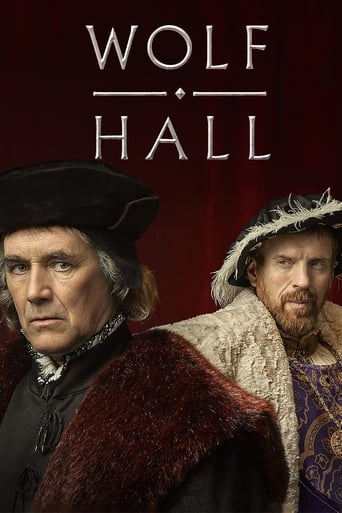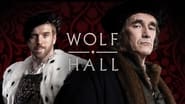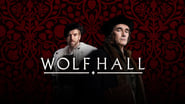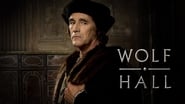Jithin K Mohan
The period setting was wonderfully done, even shooting on location. If you are patient there is a payoff for the excruciatingly slow proceedings of the series. A nobody's rise to the favours of the King of England and the famous Boleyn case is seen through the son of a blacksmith Thomas Cromwell. The attempt to make everything seen through such a man is what makes this miniseries interesting and also that same thing makes this quite boring for a large part. The character is given more importance than that he could have got. There are some interesting politics discussed here too but the focus shifts in a way that you are not sure what exactly they are trying to convey. Claire Foy was fantastic as Anne Boleyn, Mark Rylance's performance felt too underplayed and it felt more a problem of direction because he does show glimpses of brilliance.
mmabruzzo-988-281485
I am a huge History buff, and when I saw an ad for this on TV two years ago, I thought "What a cool topic!" But then I saw the PBS logo and grew disheartened. From my experience, PBS documentaries often show the only good bits of the show in the trailer, and the rest is boring. This was FAR, FAR from the truth in this case! But fast forward two years, and I am sitting at home with nothing to do. I am scrolling through the IMDb pages of my favorite actors, trying to find something new to watch. On Tom Holland's page, I found Wolf Hall and remembered back to the ad from two years ago. I thought I'd give it a whirl. And boy was it fantastic. I will admit, all of the jumps in time were confusing at first, and Thomas' daughters looked like the daughters of his sister-in-law, adding to my confusion in some of the scenes. But once you get the hang of the time jumps, the show really shines. The acting was fantastic, Mark Rylance's performance especially. The political drama was not at all boring, and it was very satisfying to watch all of the pieces come together and to watch Cromwell's "playing of the game," as Petyr Baelish from Game of Thrones would call it. This is a must watch for all history buffs out there, as well as for anyone into a good political drama with relatable characters and a good plot. As a side note, I love to play a little game where I try to spot as many familiar actors as I can in a new show. Careful viewers might be able to spot King Theoden, Tycho Nestoris of the Iron Bank of Braavos, Qyburn, Spider-Man/Peter Parker, Captain Winters, the brother of the actor who plays Stannis Baratheon, and if you are really careful, Shireen Baratheon. Happy hunting!
Prismark10
Peter Straughan condenses Hilary Mantel's award winning historical fiction novels for television. Peter Kominsky gets all the candles he needs for gloomily lit interiors but more importantly gets out great performances from his actors and a wonderful paced drama. There is little here that is stuffy or po faced.Damian Lewis is a thinner, youthful and more athletic Henry VIII here. Claire Foy (Ann Boleyn) is the chancer who uses her body to enchant Henry when almost everyone is against her. Thomas More is portrayed as a religious zealot here happy to torture and kill in the name of Rome, far removed from 'A man of all seasons.'Holding everything together is an understated but riveting performance by Mark Rylance as Thomas Cromwell. A social climber, a fixer, the son of a Putney blacksmith adept in the shadowy world of political intrigue and planning. Cromwell literally lurks in the shadows helped with all that candlelight. Cromwell is loyal too as he is with Cardinal Wolsey even after his fall from grace.The kernel of the story is familiar although it is easy to forget that this is an adaptation of historical fiction. In short it is not all true.
clanciai
Mark Rylance makes a fascinating character out of the misfortunate Thomas Cromwell, who as far as I have seen never has been done any justice or more careful impersonation on screen before. The story is well known and repeated often enough to almost the point of getting audiences fed up with it, but the characters of the drama remain inveterately of lasting and timeless interest with Henry, Wolsey and Anne Boleyn in the forefront, Henry for his dangerously psychotic capriciousness risking everyone's life in his vicinity, Wolsey for his fall and Anne Boleyn for her tragedy. To this comes the eternally important drama of Thomas More and his even more unfortunate successor Thomas Cromwell, who failed in achieving the same glory of martyrdom but instead was actually beheaded in dishonour. You could see "Wolf Hall" as a successful effort to exonerate him, as he is interestingly exposed as a victim of fate who actually had no choice but to do as he did - there was no way out of his dependence on the caprices of the King. Mark Rylance is so excellent in his portrayal, that he actually could have made a better Thomas More than Anton Lesser, who is not quite convincing as Thomas More, far too frail and almost abject, making his part almost as denigrative as the part of Cromwell is favoured. Nevertheless, the truth of this rendering of the fearsome story is probably more accurate than any earlier version. Henry is not very convincing either, though, as he is far too dashing and youngish when he should have been more sturdy and clumsy in his actual fatness - he was only this fit in his very younger days, a fault which hopelessly cripples the whole Canadian TV series with Jonathan Rhys Meyers a few years back, which is more exclusively a feast for the eyes than truthful in the least, while the best Henry VIII series remains the Granada production of 2003 with Ray Winstone and Helena Bonham Carter as Anne Boleyn - one of the best and most truthful. However, also here Anne Boleyn is made almost over-convincing with her intelligent brilliance and ambitious willfulness and for once quite awesome. Bernard Hill as her uncle Norfolk also deserves some major credit as perhaps the best actor here of them all. The greatest merit of the series however is its realism by candlelight - it is throughout photographed without artifice in light settings, which adds greatly to the general realism. In brief, yet another great and highly meritorious version of the trials of this turbulent court, adding new important aspects to understanding this troublesome and problematic chapter of history.







